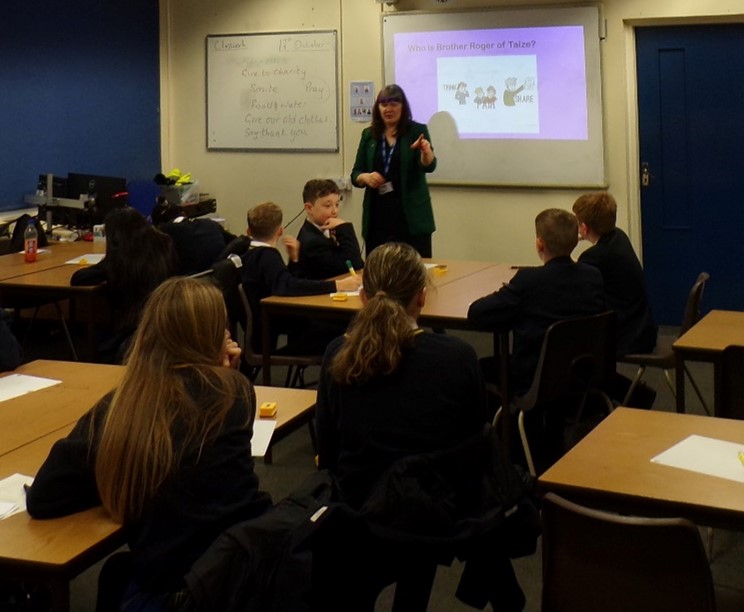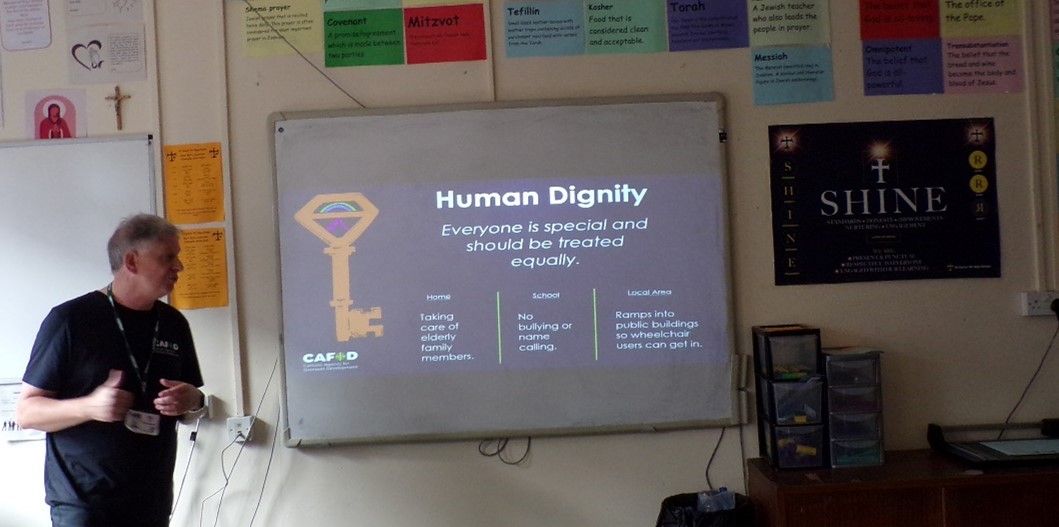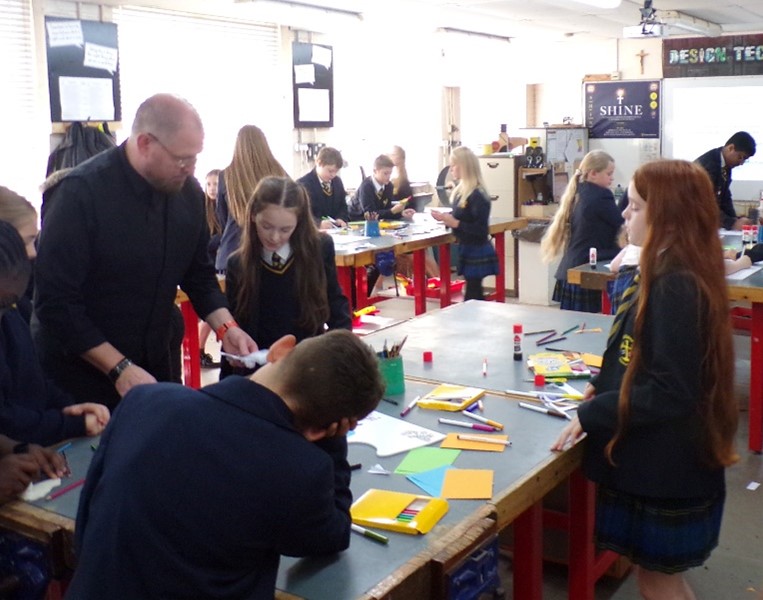Catholic Social Teaching
CATHOLIC SOCIAL TEACHING
The Catholic Church has a history of social teaching that goes back centuries and provides a compelling challenge for living responsibly and building a just society. Modern Catholic Social Teaching, rooted in Scripture and articulated through a tradition of written documents, has evolved over time in response to the challenges of the day.
The following are several of the key themes that are at the heart of our Catholic social tradition.
Life and Dignity of the Human Person
The Catholic Church proclaims that human life is sacred and that the dignity of the human person is the foundation of a moral vision for society. This belief is the foundation of all the principles of our social teaching. We believe that every person is precious, that people are more important than things, and that the measure of every institution is whether it threatens or enhances the life and dignity of the human person.
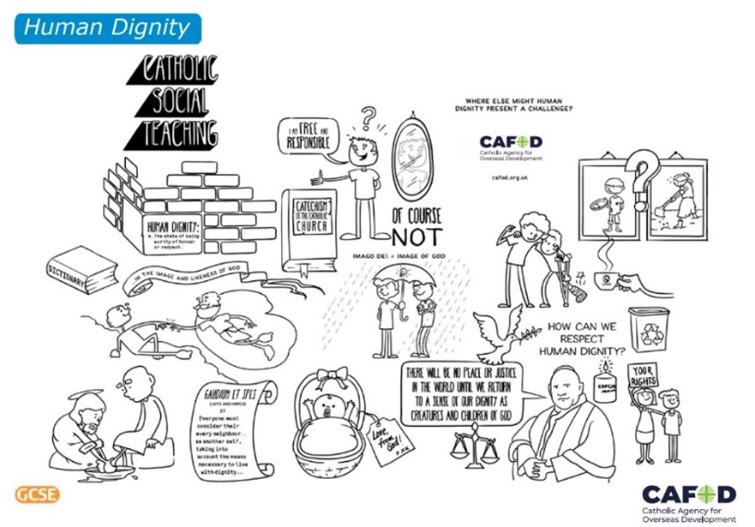
CAFOD - GCSE Human Dignity animation Cafod Clip about the Catholic Social Teaching of Human Dignity.
The Common Good
The themes of ‘Call to Family’, ‘Community and Participation’, ‘Rights and Responsibilities’, ‘Dignity of Work and Rights of Workers’, and ‘Care for God’s Creation’ all fall under the Pillar of ‘The Common Good’. This Pillar is all about how our actions towards people and the planet itself contribute to ‘The Common Good’. A Cafod video about The Common Good can be found here: https://youtu.be/VmE5gWBzfao
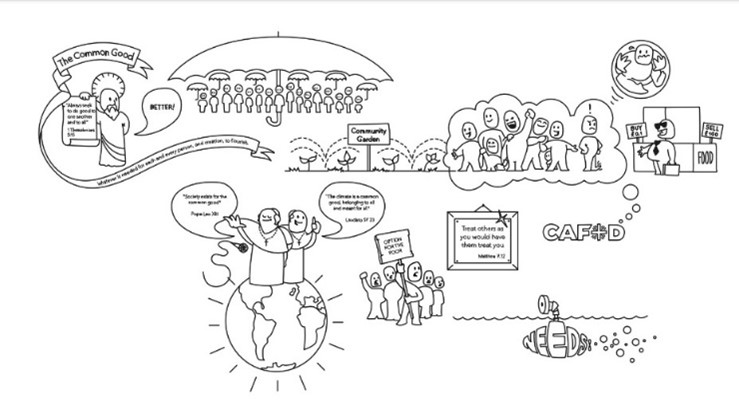
Call to Family, Community, and Participation
The person is not only sacred but also social. How we organize our society in economics and politics, in law and policy directly affects human dignity and the capacity of individuals to grow in community. Marriage and the family are the central social institutions that must be supported and strengthened, not undermined. We believe people have a right and a duty to participate in society, seeking together the common good and well-being of all, especially poor and vulnerable people.

Rights and Responsibilities
The Catholic tradition teaches that human dignity can be protected and a healthy community can be achieved only if human rights are protected and responsibilities are met. Therefore, every person has a fundamental right to life and a right to those things required for human decency. Corresponding to these rights are duties and responsibilities–to one another, to our families, and to the larger society.
Care for God’s Creation
We show our respect for the Creator by our stewardship of creation. Care for the earth is a requirement of the Catholic faith. We are called to protect people and the planet, living our faith in relationship with all of God’s creation. This environmental challenge has fundamental moral and ethical dimensions that cannot be ignored.
The Dignity of Work and the Rights of Workers
The economy must serve people, not the other way around. Work is more than a way to make a living; it is a form of continuing participation in God’s creation. If the dignity of work is to be protected, then the basic rights of workers must be respected—the right to productive work, to decent and fair wages, to the organization and joining of unions, to private property, and to economic initiative.
Preferential Option for the Poor
A basic moral test is how our most vulnerable members are faring. In a society marred by deepening divisions between rich and poor, our tradition instructs us to put the needs of poor and vulnerable people first.
https://youtu.be/OKT5iLOU4ek Cafod Clip about the Catholic Social Teaching – Option for the Poor.
Solidarity
We are one human family whatever our national, racial, ethnic, economic and ideological differences. We are our brothers’ and sisters’ keepers, wherever they may be. Loving our neighbour has global dimensions in a shrinking world. At the core of the virtue of solidarity is the pursuit of justice and peace. Pope Paul VI taught that “if you want peace, work for justice.” The Gospel calls us to be peacemakers. Our love for all our sisters and brothers demands that we promote peace in a world surrounded by violence and conflict.
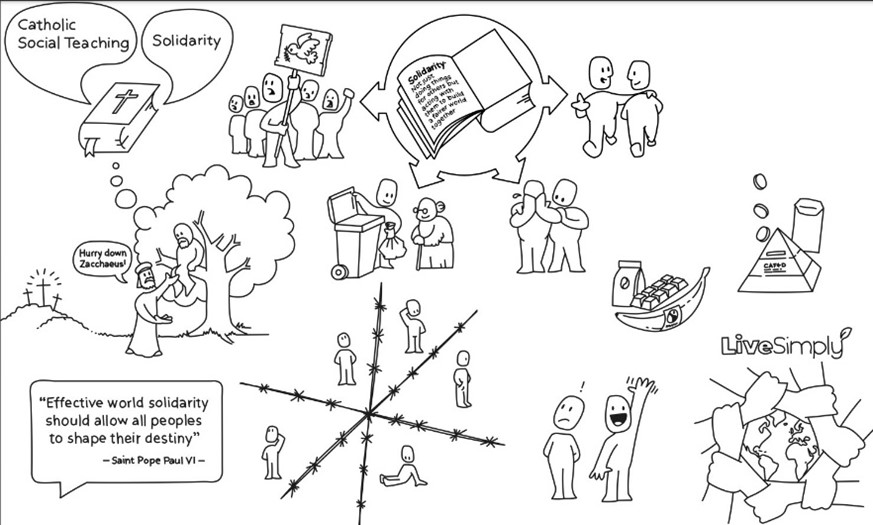
CAFOD - Catholic Social Teaching: Solidarity CAFOD Clip about the Catholic Social Teaching of Solidarity.
At All Saints’ we promote Catholic Social Teaching in everything that we do. Catholic Social Teaching is about living our values through our actions and relationships in and around school and our community. It is faith lived out throughout the entire school building and community.
Year 7 Catholic Social Teaching Day
On 18th October, Year 7 had a Catholic Social Teaching day, focusing on the work of CAFOD and CARITAS.
Pupils attended a workshop delivered by CAFOD where pupils learnt about the work of this Catholic organisation and how the themes of Catholic Social Teaching govern their work. Pupils also experienced prayer, reflection and a guided meditation with Mr Sidlow, our leader of Catholic Life and Mission and Collective Worship. Pupils attended an assembly led by Kath Ansley from Caritas where pupils learnt about the work of this charity and how it helps vulnerable people within our Diocese. Pupils also took part in a workshop about our House Saints and their Catholic Social Teaching virtues led by Miss Montgomery, Deputy Head. Pupils were taught about the lives of these individuals and how their catholic social teaching virtues can inspire us in our own lives. Pupils also completed a workshop where they created ‘jigsaw puzzles’ based on their House Saint led by Mr Crapnell – Technology Dept. The pupils had to decorate their jigsaw with quotes and images associated with their House Saint.
A liturgy was attended by the whole Year 7 cohort at the end of the day where pupils reflected on their day and we ‘joined the jigsaw pieces’ that had been created in their workshop with Mr Crapnell. This represented that as part of one family when we come together and work together we can achieve more. It also represented joining the ideas of all our saints together to show the impact that they had. As part of our Liturgy, we sang ‘Shine Jesus Shine’, which is our school hymn, and ‘Christ Be Our Light’. Both are hymns which epitomise our school motto, which is ‘Let Your Light Shine’. At All Saints’, the theme of light is integral – we encourage pupils’ light to shine through their gifts and talents, and we also encourage the light of Christ to grow in their lives. By singing these hymns, we were able to celebrate our faith and our day with the power of music.
